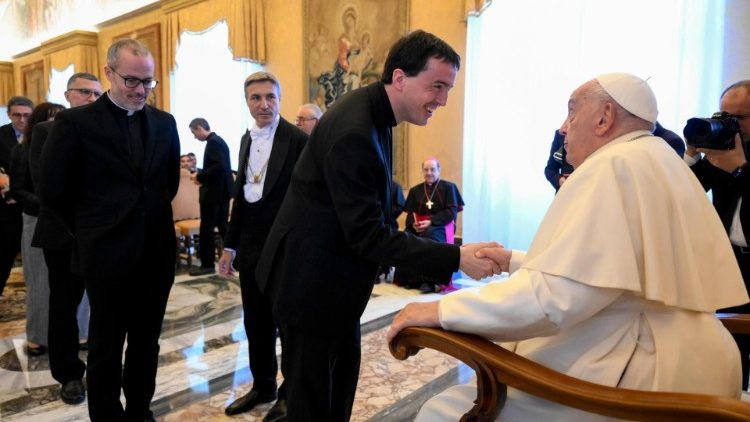
Pope to seminarians: in prisons of existential despondency
The sixth work of mercy (visiting prisoners) is recalled by the Pope to the Spanish seminarians received in audience in the Consistory Hall Nov. 16
By Lorena Leonardi – Vatican City
“To go down to prisons,” not only government prisons, ‘to offer to those imprisoned there the oil of consolation and the wine of hope,’ but also to all ”those prisons that lock up men and women in our society: ideologies, morals, those that create exploitation, discouragement, ignorance and forgetfulness of God.”
This is Pope Francis’ invitation to seminarians from the Spanish dioceses of Pamplona y Tudela, San Sebastián and from Redemptoris Mater, received in audience today, Nov. 16, in the Consistory Hall.
Welcoming the 40 or so young future priests from the Iberian Peninsula, Francis spoke in Spanish: “Your archbishop was very fond of this audience and he told me that you were counting on the affection I have for prisons, so that I would also grant you this audience.”
The seminary “is not a prison,” he jokes, but a place to learn that a priest is “a man who wants to redeem,” a “redeemer of prisoners” because “he cannot be anything but a living image of Jesus, a Redeemer with a capital R.”
Going to prisons is a priority
Several times Bergoglio calls for a “return to the prisons; please go to the prisons, go, get involved. Since I have been a bishop, on Holy Thursday, I do the washing of feet in a prison. They are the ones who most need us to wash their feet.” And he leaves room for a memory.
On the occasion of one foot washing, I was washing them for a woman, it was a women’s prison that one, and when I was about to move on to the other, she grabbed my hand, came up to my ear and said, “Father, I killed my son.” The inner dramas in the consciousness of those living in a prison. When you are priests, go to the prisons, it is a priority. And we can all say what I feel: why them and not me?
Referring to the prisons not only physical but above all mental, emotional and spiritual in which one can find oneself condemned, the Pope repeats that one receives priestly anointing precisely “to free prisoners, those who are chained, without realizing it, by so many things, by culture, by society, by vices, by hidden sins.
Docile to the spirit and free from ballast
Francis then recalls the Gospel of Luke, the meditation for the preparation of future priests, which “encourages us not to be afraid to face the temptation of an idolatrous ministry where we are at the center, seeking material power or applause,” and invites to “docility to the Spirit,” to “make the desert to encounter God,” to “empty ourselves of so many things that we carry as ballasts.”
Again, like Jesus when he goes to Nazareth, “aware that in the eyes of the world he was nothing more than Joseph’s son, one like us,” the Pope urges never to forget these roots, to be “children of the People.”
In our apostolate we cannot make distinctions between people, even more so if they are strangers or even enemies, because in God’s eyes we are all children.When we look at our brother, we recognize in him the disposition to receive the grace the Lord offers him.
Tireless bearers of mercy
From the Pope yet another emphasis from a Gospel passage, where the Lord grieves over the hardness of heart of his contemporaries who do not understand Jesus’ solicitude in freeing a woman kept bound by an evil spirit for many years: “You,” he admonishes the seminarians, “always be ready to bless, to liberate.
Finally, the exhortation to be “courageous, selfless and tireless” in bringing God’s mercy.
